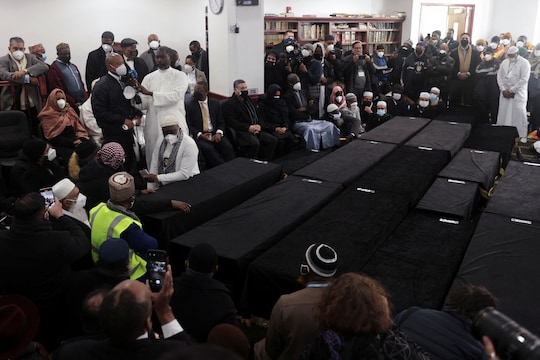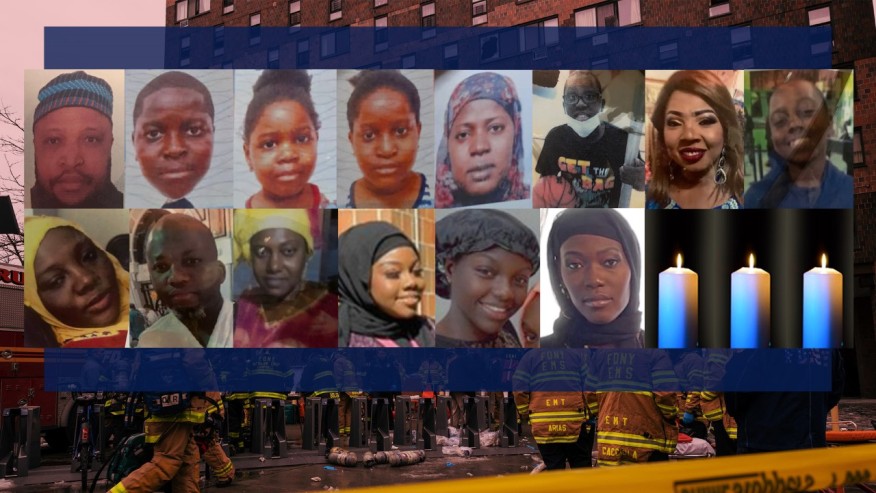The Editorial
In the late morning on Sunday, January 9th, 2022, residents of Twin Parks North West tower in the Bronx, many of whom are Gambian families, were caught in a deadly fire as they joggled with their normal morning routines. According to official sources, seventeen people died, including eight children. The following Sunday, a funeral service was held for fifteen of the victims in the Bronx. Eleven of the victims were buried on the same day while the families of the remaining victims of Gambian origin or descent decided to hold their burials in The Gambia. Some of these burials are expected to take place as soon as this Thursday. As much as this incident may be the single most deadly fire event for Gambians at home and in the diaspora, the adversity provides an opportunity to improve the lots of the families of the victims and the survivors of the fire together with other Gambian communities in the United States.
Twin Parks North West on 333 East at the intersection of 181st Street and Tiebout Avenue is the home and center of many Gambians particularly the Serakuleh or Soninke community in New York. Most Gambians affectionately call it The Touray Tower named after the late Abdoulie Touray, a native of Sotuma Sere Village, who emigrated to the United States in the 1970s and resided in the building for four decades. Many weddings, naming ceremonies, cultural activities, and rituals for members of the community were officiated in his apartment on the third floor of the building. Until recently, the building, well-kept with good security at the entrance, became the attraction for so many people who desire to live in the low-income housing. Before the fire outbreak, Gambians, Guineans, Ivorians, and Malians live on almost every floor alongside their African-Americans and Hispanic neighbors. Today, the building is empty after so many residents have temporarily vacated their apartments in the wake of the traumatic events. Touray, in coming to America, followed in the path of many of his kinsmen who traveled to Sierra Leone, Guinea, the Congos, Angola, and Western European countries to seek opportunities. Their goal was not to emigrate permanently but to eventually return to their country of origin with wealth to benefit their people. That is the story of Gambian migrants around the world who remit annually a third of the gross domestic products (GDP) of the country.

Unlike in other African countries, emigration into Western countries create structural barriers to Gambians majority of who generally travelled on non-immigrant visas. Shortly after their entrance into Europe and the United States, they fell out of compliance with visa requirements and demands. Many of them spend decades without legal means to regularize their immigration status to allow them to travel to The Gambia to visit their spouses, families, attend graduation ceremonies and weddings of their children, funeral services, or burials of their loved ones. These new immigrants are trapped without means to seek greater opportunities such as good employment, education, housing, healthcare, etc. Many of them who are yellow cab drivers have been struggling financially due to the decimation of that industry by Uber, Lyft, and the gig economy created by technological changes. So many of the families affected by the fire are, in one way or the other, impacted by the structural barrier to regularize their immigration status. Some of these people and many in The Gambian community all over the United States face the same problems and challenges that trapped them into substandard housing, poor-paying jobs, or without education to fully realize their American dreams. The tragic event at the Twin Parks North West tower as Vanessa L Gibson — President of the Bronx Borough — puts it at the funeral service that it is a “wake-up call,” “a state of emergency,” and “a call to action and attention” for all New Yorkers. It should be even more so a call to action of the Gambian community in the United States to support those amongst them who desperately need relief to regularize their immigration status.
The Gambian community in the U. S. must be its own champion through the agencies of the Gambian Organizations in such places as in the Pacific Northwest, Minnesota, Texas, Georgia, and other U. S. cities. They should concert their efforts to lobby senators and members of Congress in their respective states to pass a bill in the United States Congress to grant Gambians in the U.S. special immigration relief similar to those granted to members of communities from countries that have experienced hardships through disasters. Haiti is one good example of a country whose citizens benefited from similar immigration relief after it experienced earthquakes. These organizations could start their efforts by organizing prayer and memorial services in their local mosques and other community centers where they could invite their senators, U. S. House of Representatives members, and state and city leaders to plead with them to support the Gambian community who are truly disadvantaged in the United States. According to New York officials, these Gambians are victims of neglect by the management of the building. The victims’ advocates alleged that the city and state governments permitted the deplorable conditions in the building to persist. All of the victims who died took flight to escape through the stairwell of the building. They may have not had basic training in responding to fire emergencies. Their African-American and Hispanic neighbors, who do not have the structural barriers inhibiting the Gambian community, knew to shelter-in-place to wait for emergency rescue.
The Gambian organizations could also collaborate with the Barrow Administration to lobby the U.S. Department of State, the Department of Homeland Security, the White House, and U. S. Congress to grant reliefs that will facilitate Gambians to regularize their immigration status. The government could also ask to put an end to the deportations of non-violent Gambian detainees under U.S. immigration custody that started in 2017 after President Barrow took office. Many of the undocumented Gambians who are victims of the Touray Tower fire and in U. S. immigration detention centers could benefit from Deferred Enforced Departure (DED) that could be authorized by President Joseph Biden.
The Gambian community has many strengths such as professionals in immigration law to guide the policy changes that will benefit the community. They could work with the victims to ensure that the New York lawyers do not prey on the unsuspecting Gambian communities with lawsuits that benefit attorneys instead of the real victims. The Gambian Associations could mobilize these experts and also complement them with resources outside the Gambian community. They could collaborate with such organizations as Social Impact Strategies, among others, that are currently involved in advocating for the victims and families of the Touray Tower fire.
There is a window of opportunity to provide relief that will benefit the larger Gambian community. This is once a generation adversity the community faces in the United States. With every day that passes, the window of opportunity for policy change is narrowing which the Gambian Associations must not let go to waste before it completely shuts. But given the enormity of the challenges that lie ahead, it is quite important also for these Gambian Associations to understand the limitations imposed by fragmentations thereby necessitating a federated organization to mobilize resources to work with the U. S. federal and states governments to serve the needs of the Gambian community in the United States. Even though the Gambian Associations may not have anticipated this crisis, it’s never too late to start that work now. Time is running out.

